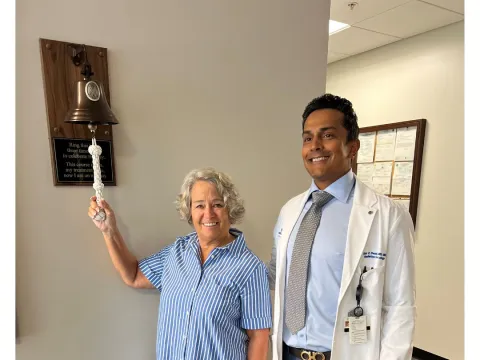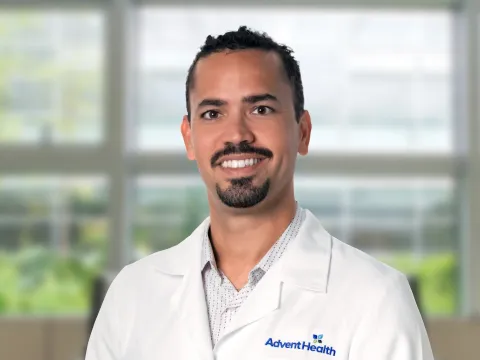- AdventHealth

Has a day gone by in the past couple of years that you have not heard the word “vaccine”? First it was COVID-19 and its multiple variants, which required the development of new vaccines. Then monkeypox took center stage, and though effective vaccines already existed, they were in short supply. Then, in July, the polio virus, the first case in the U.S. in almost a decade, was detected in an unvaccinated individual in Rockland County, N.Y. A single confirmed case may not seem like cause for concern, but experts say potentially 200 people around that case may have been exposed or are now carrying the virus. And while it may not result in paralysis – or even death – polio can have lasting, life-altering effects.
“As far as I’m seeing in the community, there hasn’t been a big concern” about the re-emergence of polio, says Fatma Levent, MD, a pediatric infectious diseases specialist for AdventHealth Orlando, who is seeing firsthand the result of a lapse in routine childhood vaccinations. “However, there may be some outbreak fatigue. People just don’t want to hear about it much.”
As National Immunization Awareness Month draws to a close, the case of an individual contracting a disease long thought to be eradicated in the U.S. is a reminder of the importance of timely vaccines, no matter the month.

As one in a series of routine childhood vaccines, the polio vaccine arrived on the scene in 1955. Unlike in other countries where the oral polio vaccine (OPV) may still be used, the inactivated polio vaccine (IPV) has been the only form given in the U.S. since 2000. Three doses are administered between 2 months and 18 months, with a final dose given between the ages of 4 and 6.
However, when it comes to adhering to an immunization schedule, Dr. Levent says, “I feel like there have been many lapses of routine vaccinations for different reasons. And that probably correlates with the outbreaks we are seeing.” Consider that, according to the Florida Department of Health, the statewide immunization coverage level for 2-year-olds was 79.3% in 2021, down from 93.4% in 2020. A number of factors may be contributing to that decline, Dr. Levent says, including vaccine-hesitant parents, vaccine access and lack of follow-up with pediatricians for well checks, particularly during the pandemic.
Whatever the reason, the end result can be a “very intense encounter,” such as that experienced by Dr. Levent in the past year. An unvaccinated child under the age of 2 contracted the bacteria Streptococcus pneumoniae – which causes invasive pneumococcal infections that babies are immunized against – and ended up needing a lung transplant.
“We see them requiring hospitalization with severe presentations, and just knowing that it is a vaccine-preventable disease makes it that much more heartbreaking,” Dr. Levent says.
Dr. Levent recommends that parents go to trusted resources, including pediatricians, primary care physicians or other trusted sources with their questions, staying away from unreliable sources and social media posts with inaccurate information.
“It’s not only your children you’re protecting; it’s the whole community,” Dr. Levent says. “If people don’t get together and the systems fall apart, then we all are in the same boat. If we don’t act on it, unfortunately we’re going to continue to see issues rise and get exposed to infections that we could have prevented.”
Recent News

AdventHealth debuts first-of-its-kind Performer Health Program in Central Florida
AdventHealth is launching the Performer Health Program, a first-of-its-kind initiative in Central Florida focused on addressing the unique health needs of artists and performers.

AdventHealth Waterman strengthens access to expert specialty care with expansion of Mount Dora medical plaza
Second floor buildout adds orthopedics, sports medicine, women’s health and heart care for Lake County

Expanding hope through innovation: AdventHealth advances cancer care across East Florida
Cancer touches nearly every family, and in Flagler, Lake and Volusia counties, the demand for timely, advanced care keeps rising. AdventHealth’s East Florida Division, which includes seven hospitals...

For two Hope Clinic patients, music spurs recovery
STROKESTRA heals stroke survivors in so many meaningful ways.

A new chapter begins: AdventHealth Avista opens its on-campus surgery center
This milestone marks a meaningful new chapter for a team whose history stretches back more than two decades.

AdventHealth Porter Performs Rare, Complex Robotic Kidney Cancer Surgery
AdventHealth Porter has reached an extraordinary milestone in surgical innovation, completing what is believed to be the first robotic left radical nephrectomy with inferior vena cava (IVC)...

Amanda Robinson, DO, joins AdventHealth Medical Group Family Medicine, Internal Medicine & Pediatrics at Curtis Parkway
AdventHealth is pleased to announce that Amanda Robinson, DO, has joined AdventHealth Medical Group Family Medicine, Internal Medicine & Pediatrics at Curtis Parkway.

Helping the Helpers: Spotlight on AdventHealth Avista’s Director of Supply Chain, Mike Vos
For Mike Vos, Director of Supply Chain at AdventHealth Avista, caring for others isn’t just part of the job - it’s woven into his family story. With a mother who is a career nurse and now Director of...

New surgeon expands local access to advanced colorectal care in Volusia County
Dr. Mark Heimberger joins AdventHealth as part of its continued investment in bringing minimally invasive and robotic colorectal treatment options to the region’s growing community.

Albit Paoli, MD joins AdventHealth Medical Group Orthopedics & Sports Medicine
AdventHealth is pleased to announce that Albit Paoli, MD, has joined AdventHealth Medical Group Orthopedics & Sports Medicine at Calhoun and AdventHealth Medical Group Orthopedics & Sports Medicine at...

Dr. Phillips Center launches free Frontyard Holiday Festival supported by AdventHealth
The Dr. Phillips Center is launching its first-ever Frontyard Holiday Festival supported by AdventHealth.

AdventHealth expands access to primary care in the heart of DeLand
AdventHealth has opened a new Primary Care+ location in the heart of downtown DeLand, giving residents a simple way to get everyday care close to where life happens. The primary care practice offers...
